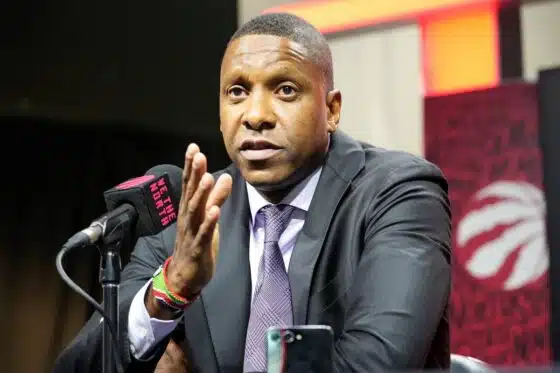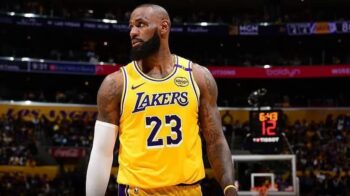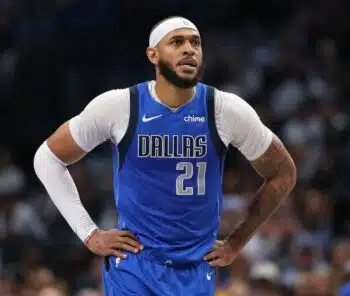Headlines
Making Sense Of Masai Ujiri’s Toronto Raptors Exit

TORONTO — Maple Leaf Sports & Entertainment (MLSE) decided it was time to move on from Toronto Raptors President and Vice Chairman Masai Ujiri after 13 years at the helm.
It was a cold, calculated decision. Speaking with media a couple hours after the decision was announced to the public with a Canada Day long weekend as the backdrop, MLSE President and CEO Keith Pelley said he had been in conversation with Ujiri regarding the future for the last few months. The decision to move on was made earlier this month.
Ujiri, ever the professional and Raptors loyalist, suggested it would be best to depart after the completion of this year’s Draft. Pelley saw the track record and saw the value. After the selections of Collin Murray-Boyles and Alijah Martin were complete, Ujiri’s departure was announced Friday, with a year remaining on his contract.
“There are major factors that go into a decision this large,” Pelley said. “The primary reason in this case was the situation and where we currently are in basketball operations. As I talked about, the stability with our roster, the stability with our front office and the stability with our coaching staff.
“That allowed us to make a decision to move forward.”
Ujiri’s History Of Success
So, to sum up, in having stability, Pelley and MLSE decided to cut the tree right at its base.
A quick history lesson. In the 18 years of existence prior to Ujiri’s arrival, the Raptors won exactly one playoff series and never experienced a 50-win regular season. In the 12 seasons with Ujiri, Toronto had five 50-win seasons and won nine playoff series, including the 2019 NBA championship.
It’s been a lean few years for the Raptors, having missed the playoffs in each of the last three seasons. They finished 25-57 in 2023-24 and 30-52 this past season. As Pelley said, though, the organization is in a stable place having completed the pivot from a Pascal Siakam-Fred VanVleet-OG Anunoby core to Scottie Barnes, Brandon Ingram and Immanuel Quickley as centerpieces.
Beyond the on-court success, Ujiri firmly entrenched himself within the Toronto community. His media opportunities became must-see TV, pushing an insecure city to believe in itself and for the fans to believe in themselves. His larger than life efforts with his youth basketball program, Giants of Africa, helped further establish the good he wanted achieve and the genuine passion he had for giving back to his community.
Recently, we saw what Luka Doncic meant to the city of Dallas. It is virtually impossible for an executive to be revered the same way a player is.
That slightest possibility only exists for someone like Ujiri in Toronto. He departs both a legend and a hero for completely reshaping the Raptors from the butt of NBA jokes to champions.
Decision Is Not Performance-Based
This day has been coming since 2021, when Ujiri was negotiating a new contract.
The people he was primarily negotiating with were executives of Bell and Rogers, a pair of media corporations that each held a 37.5 percent stake in MLSE since 2012. Edward Rogers, now executive chairman of Rogers, fought to oust Ujiri.
Not only did he want Ujiri out, he reportedly went as far as to call Ujiri and tell him he wasn’t worth the money he was being paid. He is also believed to have called Ujiri arrogant, which left the Raptors executive fuming and considering stepping away from the team.
Larry Tanenbaum, then the MLSE chair, has long been viewed as the effective owner of the Raptors. He has long been a supporter of Ujiri and, alongside Bell, was ready to give Ujiri a five-year deal that would keep him happy. The good guys won that time.
Plenty has changed since 2021, though.
In September 2024, Rogers bought out Bell’s 37.5 percent stake to increase its own ownership stake to 75 percent. Tanenbaum, meanwhile, divested a bit and his shifted some focus to ownership of the city’s new WNBA team, Toronto Tempo. While he maintained a 20 percent stake in MLSE and is the Chair Emeritus of the Board, the dominant Rogers stake was too big a factor.
Ujiri has long valued autonomy in his process while wielding a vision on the court that seemed too ambitious for what Rogers was trying to achieve off of it. Rogers now had an open lane for what transpired Friday.
Raptors Gambling With Uncertain Future
While Pelley may say it was his decision, it’s quite frankly corporate PR speak to save from saying it’s what the board of directors, specifically Ed Rogers, wanted. They simply were not willing to pay what it would take to keep one of the best executives in North American sports.
Prior to Ujiri, the franchise had a winning percentage of .407. He departs with Toronto having won 56.5 percent of its games during his reign. All that winning has helped take the franchise’s worth from $404 million in 2013 to $4.4 billion as of November 2024.
Even with the recent on-court struggles, there are dots to be connected with the manner in which the business wheels have turned to impact that. The Raptors are looking to exit the rebuilding stage and are already approaching the luxury tax.
When asked what Pelley will be looking for in the new president, he said he wants a strong, prominent business man with an in-depth background in basketball operations. He also confirmed current general manager Bobby Webster has received a contract extension and will interview for the position of team president.
It’s fairly clear cutting costs and managing finances effectively will be the modus operandi moving forward.
An era of Raptors basketball marked by passion and the relentless pursuit of winning looks set to be replaced by one of cold-hearted decision-making and budget cuts.











